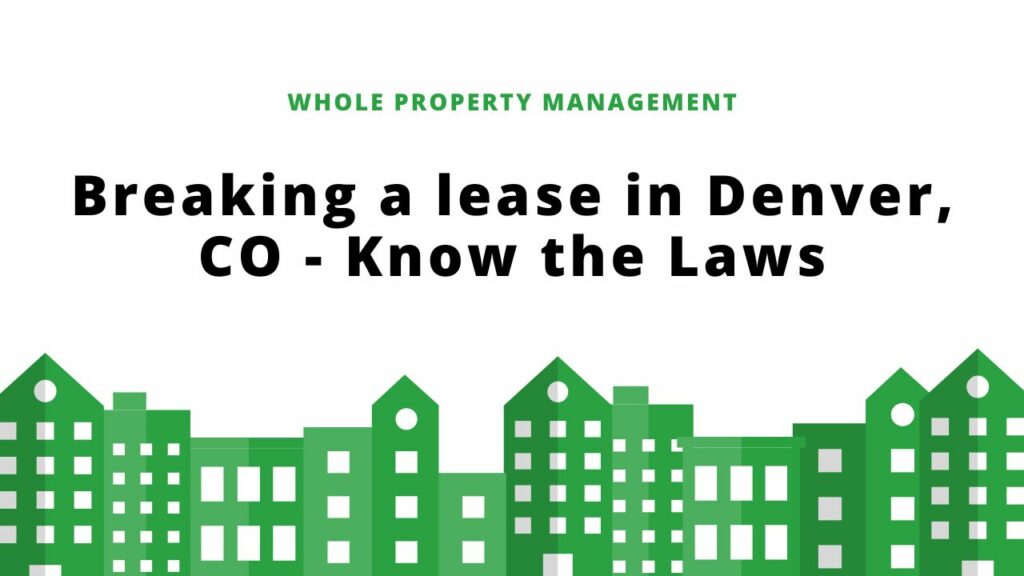Breaking a Lease in Denver, CO – Know the Laws

A lease agreement legally ties a landlord to a tenant for a specific period of time, as stated on the lease. Often, this period ranges from between six months and a year, and during this entire time, both parties must abide by all the terms of this agreement.
But Colorado tenants can break their lease agreement for all manner of reasons. From domestic violence to joining active military service. So, does that mean breaking a lease removes a tenant from their responsibilities, like paying rent or managing a security deposit?
It depends!
In this blog, we at Whole Property Management will go over what conditions in which a Colorado tenant can break their rental agreement and when they can’t. You’ll also learn whether Colorado laws require landlords to make reasonable efforts to re-rent their property or not and what landlord tenant law has to say about breaking leases.
Legally Justified Reasons for Breaking a Lease in Colorado
Once a tenant signs the lease agreement, they gain a variety of different responsibilities. Including, playing rent due under the lease. So, if a tenant breaks their lease before it expires, it is possible for you to hold them liable for any rent remaining under the lease.
But that may not be possible if the tenant breaks their lease in Colorado for a legally justified reason. The following are some situations in which a tenant can break their lease without any legal repercussions:

Early Termination Clause
Have you made a provision in your lease agreement allowing your tenants to terminate their lease early? If you have, then this provides your tenants with a legal way to break their lease in Colorado.
Usually, lease agreements with an early termination clause require that tenants meet certain requirements. Typically, this would be a fee for leaving the rental property, but it is up to the landlord and the tenant to agree to these conditions before signing the lease.
Military Service
Another reason a tenant can use to break their lease early in Colorado is if they are called to military service. This is because tenants who have been relocated due to military service are protected by the Servicemembers Civil Relief Act.
But the act does force the tenant to provide their landlord with certain information should they use it to break their lease:
- Show proof that they signed the lease agreement prior to entering active military duty.
- To show proof that they intend to remain on active duty for a duration exceeding ninety days.
- Serve an advance notice attached to any deployment letters the tenant receives.
The act further specifies that only “Servicemembers” qualify. This includes members of the armed forces, the activated National Guard, and the commissioned corps of the Public Health Service.
But even if all of these requirements are met, the lease doesn’t automatically end. The earliest the lease can end is thirty days after the next rent period begins.
Warranty of Habitability
Landlords are required by Colorado state law to abide by the warranty of habitability. The warranty requires landlords to maintain their rental units to certain standards of health and safety.
In the state of Colorado, the warranty specifically requires landlords to do the following:
- Ensure any appliances included in the lease are working.
- Ensure that the flooring is safe and in good condition.
- Ensure that the railings and stairs are safe.
- Provide your tenant with a trash can if there is a pickup service.
- Provide functioning sanitation facilities.
- Provide functioning electrical and plumbing systems.
- Ensure the HVAC equipment is working.
- Provide both cold and hot running water.
- Ensure areas like the roof and walls are adequately weatherproofed and leak-free.
- Provide doors and windows that are functional.
- Comply with the Fair Housing Act at all times.
If the landlord fails in this responsibility, your Colorado tenant has several legal options to pursue. Including, withholding rent, filing a lawsuit against you, or even reporting you to public health officials.

Landlord Harassment
Colorado laws also allow tenants who have been harassed by their landlords to break their lease without penalty. But this action must be serious enough to warrant such a justification, such as is the landlord repeatedly violates the following:
- Illegally entering your tenant’s rented unit.
- Gas hazards.
- Refusing to accept rent payments from your tenant.
- Sexually harassing your tenant.
- Physically or verbally threatening your tenant.
- Domestic Violence.
If your tenant is a domestic violence victim, Colorado law provide them with special rental provisions. The following are some of them.
- Protection from lease termination.
- Protection from any penalties arising from early lease termination.
Legally Unjustified Reasons for Breaking a Lease in Colorado
The following reasons do not offer tenants in Colorado enough justification to legally break their lease early:
- Buying a house
- Job relocation
- Upgrading or downgrading the property.
- Separation or divorce
If a tenant uses any illegal reason for breaking their lease you are within your rights to proceed with the legal Colorado eviction process.
Colorado Landlords’ Duty to Mitigate Damages
Colorado landlords are required to mitigate damages after a tenant breaks their lease. In other words, you must take reasonable steps to find a replacement tenant. If you’re lucky to land one, then the tenant will only be responsible for paying the remainder of the rent still due under the lease.

Bottom Line
While the Colorado landlord-tenant laws are complex, one of the most important aspects of them is how and when a tenant can legally break a lease. So, if you have any further questions regarding lease violations or any other property management tasks, please don’t hesitate to contact us.
Disclaimer: This content is in no way intended to be a substitute for professional advice from a qualified attorney. Also, laws may change, and this content may not be updated at the time you read it. If you have a specific question regarding Colorado tenancy laws, Whole Property Management can help.
